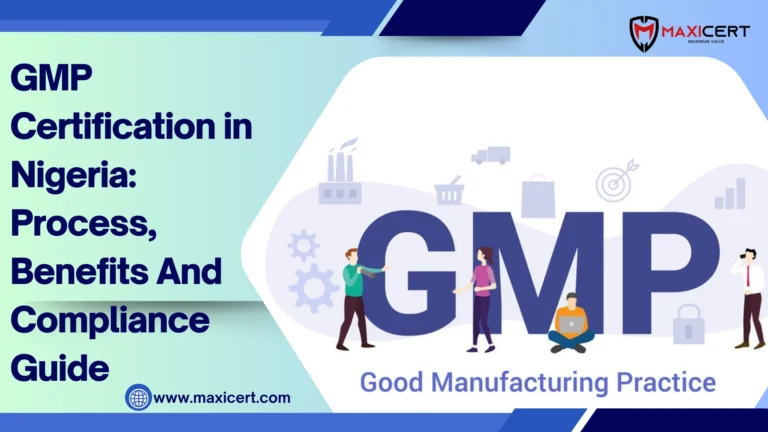GMP Certification in Nigeria: Process, Benefits And Compliance Guide

Introduction
GMP certification is not merely a regulatory obligation—it is a badge of quality and safety that directly addresses consumers, regulators, and international trade partners. In Nigeria, industries such as food, pharmaceuticals, cosmetics, and herbal products increasingly need GMP, where product safety and quality can make or break the reputation of a brand.
If your company is looking to capture customer confidence, comply with regulations, and reach a global market, then understanding and obtaining GMP certification is a must. Everything you need to know is covered here, breaking down what GMP certification is, why it is important in Nigeria, the process of being certified, and the advantages it offers.What is GMP Certification?
GMP means Good Manufacturing Practice. It is an internationally accepted system which guarantees products are made and controlled to strict quality standards. GMP embraces all aspects of production—raw material procurement and equipment maintenance to hygiene of staff and packaging.
Some of the industries which frequently need GMP certification in Nigeria are:
- Food and drinks
- Drugs
- Traditional and herbal medicines
- Cosmetics and personal care items
- Medical devices
By adhering to GMP guidelines, companies minimize the risk of contamination, mislabeling, and product defects—ensuring consistency and reliability in manufacturing.
Request A Free Quote
Why GMP Certification is Important in Nigeria
Nigeria’s rapidly expanding consumer base and regulatory environment necessitate GMP certification as not only a necessity but also a commercial benefit. Here’s why it is important:
- Consumer Confidence: Nigerian consumers are increasingly becoming quality- and safety-conscious consumers. GMP certification instills trust.
- Regulatory Compliance: GMP conforms to NAFDAC (National Agency for Food and Drug Administration and Control) standards to elude Nigerian penalties and ensure smooth operations.
- Global Competitiveness: Exporters have easier market access overseas since GMP is internationally accepted.
- Reputation Boost: GMP-certified companies emerge as dependable, quality-driven brands.
The GMP Certification Process in Nigeria
Obtaining GMP certification is not as daunting as it sounds, with a clear-cut process. Here’s a step-by-step explanation:
Step 1 – Application and Documentation
- Apply to an accredited certification body
- Submit company information, manufacturing practices, quality manuals, and compliance documents
Step 2 – Gap Analysis & Pre-Assessment
- Certification body examines in-place system
- Pinpoints areas of non-compliance which require rectification
- Issues recommendations for change
Step 3 – Implementation of GMP Standards
- Train personnel in hygiene, quality control, and safety procedures
- Modernize facilities, processes, and documents where necessary
- Develop standard operating procedures (SOPs)
Step 4 – Certification Audit
- On-site audit by certification auditors
- Facility, equipment, and process inspection
- Confirmation that standards of GMP are being adhered to
Step 5 – Certification & Surveillance
- Company issued GMP certification if found compliant
- Typically valid for 3 years
- Surveillance audits at regular intervals ensure ongoing compliance
Key Advantages of GMP Certification in Nigeria
Gaining GMP certification provides Nigerian companies with both short-term and long-term benefits:
- Better Product Quality: Guarantees consistency in production and fewer faults.
- Regulatory Compliance: Seamless clearance by NAFDAC and other regulatory bodies.
- Lower Risk: Reduces risk of contamination, recall, or complaints by consumers.
- Market Development: Facilitates expansion into domestic and foreign markets.
- Customer Confidence: Gains the confidence of consumers, distributors, and retailers.
- Brand Value: Certification acts as a guarantee of professionalism and credibility.
Challenges Nigerian Companies Encounter with GMP Compliance
Though GMP certification has obvious advantages, most Nigerian companies encounter difficulties such as:
- Infrastructure Expenses: It is costly to upgrade facilities and equipment.
- Knowledge Shortages: It is hard to find trained personnel in quality assurance and compliance.
- Compliance Barriers: It is challenging to deal with NAFDAC audits and inspections.
- Uniformity Challenges: Adhering to compliance at all levels of production is demanding and needs to be monitored.
It is easier for companies to overcome these barriers with the assistance of expert consultants.
How Maxicert Facilitates Nigeria GMP Certification
At Maxicert, we know that certification is not just a certificate—it is a tool for development. Our experts offer:
- Gap Analysis: Finding the areas in which your existing system fails
- Consultation & Guidance: Assisting you to map processes against GMP requirements
- Staff Training: Empowering your employees with the correct expertise
- Documentation Support: Writing SOPs, manuals, and compliance lists
- Audit Preparation: Preparing you for inspections and surveillance audits
Through collaboration with Maxicert, Nigerian businesses can obtain GMP certification with ease and minimal interference with their operation.
Conclusion
GMP certification for Nigerian businesses is not merely a matter of compliance—it is a matter of creating a superior brand, winning customer loyalty, and entering international markets. While consumer expectations continue to increase and regulators continue to make control tighter, companies focusing on quality will always be ahead.
At Maxicert, we make GMP certification easy, dependable, and growth-oriented.
GMP certifies your business to international safety and quality standards. Get in touch with Maxicert today to begin your certification process.

Get In Touch

Get In Touch

Get In Touch
Need A Free Estimate?
Get a free consultation and Checklist to get certified for ISO , HALAL, CE Mark Certification.
FAQ
Which industries require GMP certification in Nigeria?
Food, pharma, cosmetics, beverages, and herbal medicine sectors.
How much time is required for GMP certification?
Depending on preparedness, 3–6 months may be required.
Who gives GMP certification in Nigeria?
Certified bodies accredited by international and local authorities.
Is GMP certification time-bound?
Yes, usually after 3 years, but annual surveillance audits are conducted.



